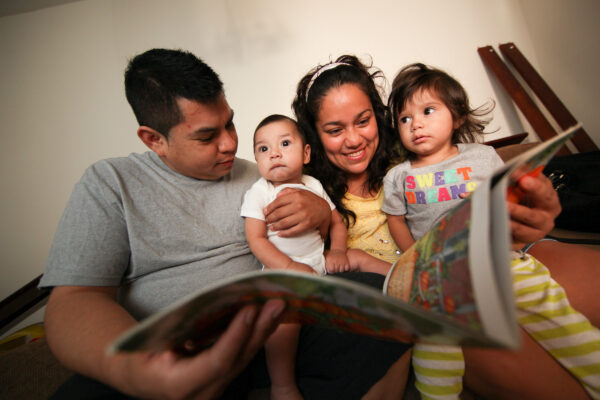One Big Doable Thing! Elevating Comprehensive Developmental Promotion and Preventive Services With the Family-Engaged Well Visit Planner Approach

On September 10, 2024, the Early Childhood Developmental Health Systems (ECDHS): Evidence to Impact Center hosted a webinar focused on the family-engaged Well Visit Planner. In this webinar, presenters shared how to leverage existing system strengths and implement the Cycle of Engagement Well Visit Planner approach, which is designed to advance “through any door” health promotion and prevention services. Participants learned about child flourishing and available data to inform and spark state and local partnerships and hear about the practical application of the Well Visit Planner in a community health center setting. The learning objectives were to:
- Identify mindsets and pathways for leveraging existing early childhood systems to improve access to comprehensive health promotion and preventive services that engage families in ways that effectively promote the early relational health required to foster whole child and family flourishing.
- Learn about how the family-engaged Well Visit Planner approach addresses key requirements, including comprehensive early developmental screening aligned with Bright Futures and challenges related to assuring high-quality, personalized well-child services that put families at the center and connect the pediatric health system with the broader early childhood system.
- Explore the application of the Well Visit Planner approach through a case example in a community health center and consider how this approach helps improve access to, and the quality of, well visits during early childhood.
To learn more, download the presentation slides and scroll down to watch the recording and read key webinar highlights and takeaways.
Key Takeaways
- Well visits are a critical opportunity for families and health providers to connect, and national Bright Futures Guidelines recommend 15 well visits in the first 5 years of life. However, there are wide and persistent gaps in the utilization and quality of services. These gaps require innovative, family-centered strategies that efficiently provide families with essential, required information and free up time to address their goals and priorities, promote early relational health, and foster the healthy development and flourishing of the whole child and family.
- Developed by the Child and Adolescent Health Measurement Initiative (CAHMI), the Well Visit Planner (WVP) approach aims to achieve One Big Doable Thing! to ensure the universal provision of Bright Futures Guidelines-aligned health promotion and preventive care with real engagement of families and enabling “through any door” collaboration across early childhood systems.
- The WVP approach features a family-facing digital tool that streamlines and integrates comprehensive screening and priority setting and helps families and health professionals focus time on the unique needs, goals, and priorities of each child and family. The WVP educates and engages families as partners while freeing up time to focus on promoting early relational health and building the trust needed to address risks and promote positive childhood experiences.
- The WVP digital tool is available in English and Spanish and covers 15 age-specific well child visits. Families can sign up for personal accounts utilizing a secure dashboard or use without an account. Free for families, the WVP takes about 10 minutes using three easy steps:
- Families learn about and complete age-specific screeners/assessments based on Bright Futures Guidelines;
- Families choose priorities from the many age-specific topics identified in Bright Futures Guidelines, and they get resources and tips on how to discuss their goals and priorities with their child’s provider; and
- Families receive an auto-generated Well Visit Guide summarizing results with a focus on their strengths, needs, and priorities and providing tips and links to resources specific to their needs and priorities.
- From a primary care clinic perspective, the WVP supports the success of other approaches like HealthySteps, Reach Out and Read, and the use of family specialists. It can be customized by each care team using the WVP online Cycle of Engagement platform.
- Using the unique URL generated, clinics invite families to complete the WVP prior to their child’s visit. The WVP can be done at home, in the waiting room, or even in the visit room on a computer, tablet, or smartphone, with or without help, as required.
- Providers use their secure data dashboard to access the auto-generated Clinical Summary based on family responses, providing an integrated “at a glance” view of screening results and family priorities. Families and providers share the same data and agenda. Aggregate data across families is also available. Clinical Summaries can be easily scanned or electronically integrated into electronic health records, and data elements can also be integrated if enabled by the clinic.
- Research and use of the WVP shows that it can support more effective team-based care around the promotion of early brain development, early relational health, building and sustaining supportive relationships with families, and meeting screening requirements, while also improving workflow efficiency, quality of care, and even reducing urgent care utilization.
- The webinar featured use of the WVP by People’s Community Clinic (PCC) in Texas. PCC uses the WVP approach to conduct child and family screenings and prepare for a family-centered well visit. Since the WVP is easy to sign up for and use, the clinic was able to adopt and implement the WVP on a compressed schedule, including the creation of a customized WVP to use with families. The clinic has found pre-visit completion of the WVP to be important for optimizing the benefits of the WVP in the primary care setting with positive feedback from families and clinical team members alike.
- The webinar featured use of the WVP by People’s Community Clinic (PCC) in Texas. PCC uses the WVP approach to conduct child and family screenings and prepare for a family-centered well visit. Since the WVP is easy to sign up for and use, the clinic was able to adopt and implement the WVP on a compressed schedule, including the creation of a customized WVP to use with families. The clinic has found pre-visit completion of the WVP to be important for optimizing the benefits of the WVP in the primary care setting with positive feedback from families and clinical team members alike.
- The WVP can be used by any early childhood system and has been used through Head Start, in home visiting, and through community-based resource and referral programs like Help Me Grow. The WVP data-sharing platform supports data sharing across early childhood system partners. The WVP is featured as an example tool to foster integrated early childhood developmental health systems through the Engagement In Action Framework (EnAct!), which further delineates strategies, data, policies, and partnerships for success.
Cycle of Engagement Well Visit Planner Resources
- Family-Facing Overview Videos in English and Spanish
- Family-Facing Website
- Child Health Professional Overview Video
- Provider and Professional Website
- Child Health Professional Account Sign-Up Demo Video
- Clinic-Focused 2-Page Overview
- Example Family Outreach Flyer
- Summary of Content and Benefits
- Community Partner Focus Overview
- Engagement in Action (EnAct!) Framework 2-Page Summary
CAHMI’s “One Big Doable Thing!” Story: Meeting the Moment Where the Science of Healthy Development, Lived Experiences, and Practices Meet
- The Aim: child flourishing, school readiness, family resilience
- The Focus: early relational health; safe, stable relationships and environments
- The Requirement: a whole-child, whole-system approach
- The Key: family engagement in every encounter
- The Opportunity: optimize existing health promotion and prevention infrastructure through the power of well-child visits
- The Approach: a through any door Cycle of Engagement with no broken links
- The System: leverage shared accountability to drive system integration with the Well Visit Planner and the Engagement In Action Framework (EnAct!)
- Impact Pathways Where “Everyone Leads”: mindsets, partnerships, practices, and policies
Speakers
Christina Bethell, PhD, MBA, MPH, Director, Child and Adolescent Health Measurement Initiative (CAHMI)
Christina Bethell, PhD, MBA, MPH, is a professor at the Johns Hopkins Bloomberg School of Public Health and School of Medicine. Her research focuses on building and translating the science of healthy development of children, youth, families, and communities. With roots in national and state health care policy, financing reform, and delivery system redesign, Dr. Bethell is the founding director of the Child and Adolescent Health Measurement Initiative (CAHMI) which, since 1996, has worked to promote the early and lifelong health of children, youth, and families through family-centered data, tools, and research. She has developed and advanced an array of child and family health measures to address the social and relational roots of well-being and the quality of health care systems and structures that influence well-being, including nationally and internationally used measures of the family-centered medical home, adverse childhood experiences (ACEs), positive childhood experiences, family resilience, child flourishing, and the Whole Child Risk Index. Her research has led to the development of the national Prioritizing Possibilities agenda to prevent and address ACEs, providing testimony to the U.S. House Committee on Oversight and Reform on identifying, preventing, and treating childhood trauma, informing the American Academy of Pediatrics relational health policy statement and the design of the Engagement In Action (EnAct!) Framework to catalyze statewide integrated relational systems of care. She earned an MBA and an MPH from the University of California, Berkeley and a PhD in public policy and health services research and policy from the University of Chicago.

Barbara Leach, Family Support Specialist, UNC School of Social Work
Barbara Leach is a family support specialist and special projects coordinator with the Family Support Program at the UNC School of Social Work. She has more than 30 years of personal and professional experience advocating for families with children who have intellectual/developmental disabilities and other special needs. She served as project coordinator for two successful Family Support 360 Projects of National Significance, which were funded by the U.S. Administration on Developmental Disabilities. A key component of these projects was the use of a “family navigator” to assist families to identify family-driven goals, develop plans, and support families in goal achievement. In addition, family navigators facilitated access to formal and informal services and resources and modeled skills needed for individual and family advocacy and empowerment. Barbara played a key role in developing the family navigator role and job description that the Family Support 360 Projects used across the country. She is the recipient of the 2019 Excellence in Community Engagement Award.

Louis Appel, MD, MPH, Director of Pediatrics, People’s Community Clinic
Louis Appel, MD, MPH, serves as director of pediatrics at People’s Community Clinic in Austin, Texas. Dr. Appel provides primary pediatric care at the clinic in addition to overseeing the clinical programs. At the clinic, he has championed the promotion of early relational health and projects on group pediatric well-child checks, postpartum depression screening, lactation support, and childhood obesity prevention focused on the prenatal and immediate postpartum periods. He is a member of the Harvard Center on the Developing Child’s Pediatric Innovation Initiative working to develop a panel of biomarkers of chronic stress activation in children. He is the immediate past president of the Texas Pediatric Society. In the past he also has served as the Community Access to Child Health (CATCH) program facilitator for District VII of the American Academy of Pediatrics. A graduate of Princeton University, Dr. Appel received his medical degree from Harvard Medical School and obtained his MPH at the Harvard School of Public Health, with a concentration in public management and community health. He completed his pediatric residency at the University of Washington in Seattle.





